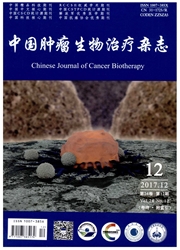

 中文摘要:
中文摘要:
目的:构建稳定表达人CD133基因的脑胶质瘤U251细胞株,并探讨CD133对U251细胞生物学行为的影响。方法:将人CD133全长cDNA构建入逆转录病毒表达载体pEGZ-Term,包装成逆转录病毒pEGZ-Term-CD133,进而感染脑胶质瘤U251细胞株。流式细胞术及Real-time PCR检测感染后U251细胞CD133分子的表达。细胞计数法、神经球形成实验观察CD133过表达对U251细胞体外的增殖和神经球形成的影响。裸鼠皮下成瘤法检测感染后U251细胞的体内致瘤性。结果:成功构建pEGZ-Term-CD133逆转录病毒表达载体,并获得稳定表达CD133的U251细胞。相比U251-mock、U251细胞,U251-CD133细胞高表达CD133 mRNA[(7 400.2±5 003.4)vs(2.0±1.1)、(1.0±2.2),均P=0.0007)和蛋白。感染pEGZ-Term-CD133对U251细胞的体外增殖并无影响(P〉0.05);但在无血清神经干细胞培养条件下,U251-CD133细胞所形成的神经球数量显著高于U251-mock和U251细胞[(34.0±7.5)vs(14.6±2.3)、(11.5±1.3)个,均P〈0.01]。接种量为1×105个细胞时,U251-CD133细胞在裸鼠体内的成瘤时间(32 d)少于U251-mock细胞(38 d)、成瘤率更高(100%vs 30%),在第41天时,肿瘤体积显著增大[(180.3±146.8)vs(4.0±0.0)mm3,P=0.003]。结论:CD133分子不影响脑胶质瘤U251细胞的体外增殖,但可促进U251细胞神经球的形成和致瘤性。
 英文摘要:
英文摘要:
Objective:To study the impact of CD133 on biological characteristics of human glioma U251 cells by con- struetion a U251 cell line stably overexpression human CD133 gene. Methods: The full length human CD133 cDNA was sub-cloned into retroviral expressing vector pEGZ-Term to obtain recombinant pEGZ-Term-CD133 retrovirus. Then, U251 cells were infected by pEGZ-Term-CD133 retrovirus. The expression of CD133 on infected U251 ceils was detected by flow cytometry and real-time PCR. By cell counting and neurosphere formation analysis, the impact of CD133 overexpression on the proliferation and neurosphere formation of U251 cells in vitro was determined. Tumorigenicity was evaluated by subcu- taneous injection of CD133 infected U251 cells into the nude mice. Results: The pEGZ-Term-CD133 retrovirus expression vector was constructed successfully and a CD133 stably infected U251 cell line was obtained. Compared with U251-moek and U251 cells, the expressions of CD133 mRNA ( [ 7 400.2 ±5 003.4 ] vs [ 2.0 ± 1.1, 1.0 ±2.2 ] ; all P = 0. 0007 ) and CD133 protein were significantly increased in U251-CD133 cells, pEGZ-Tetm-CD133 retrovirus infection showed no effect on the proliferation of U251 cells (P 〉0.05 ). However, the neurosphere formation of U251-CD133 cells was obvi- ously higher than U251-mock and U251 cells in the presence of serum free neurosphere medium ( [ 34.0 ± 7.5 ] vs [ 14. 6 ± 2.3 ], [ 11.5 ± 1.3 ] ; all P 〈 0.01 ). Compared with the U251-mock cells, the tumor formation time of U251- CD133 cells was shorter (32 d vs 38 d), the tumorigenesis ratio was higher (100% vs 30% ) and the tumor volume was significantly larger ( [ 180.3 ± 146.8 ] vs [ 4.0 ± 0.0 ] mm^3, P = 0. 003 ) at 41 d when subcutaneous inoculated 1 x 105 cells. Conclusion: CD133 has no influence on proliferation of glioma U251 cells, but could enhance neurosphere forma- tion and tumorigenicity of U251 cells.
 同期刊论文项目
同期刊论文项目
 同项目期刊论文
同项目期刊论文
 期刊信息
期刊信息
